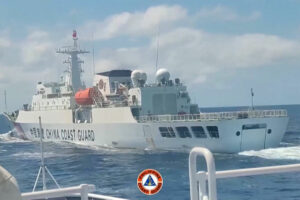
Philippines, US talk about ways to boost alliance amid China tensions
By Kyle Aristophere T. Atienza, Reporter
THE PHILIPPINES’ Defense chief and the US ambassador in Manila on Jan. 19 discussed ways to boost the two countries’ alliance amid worsening sea tensions between the Philippines and China.
Defense Secretary Gilbert C. Teodoro and US envoy MaryKay L. Carlson “discussed areas of mutual concern and ways to further enhance the two countries’ enduring alliance,” the Defense department said in a statement late Saturday.
In an X post, Ms. Carlson said it was a “productive meeting on how we can maintain the historic momentum of the US-Philippines relationship.” The two met at her house near the Philippine capital.
The US has led international condemnation of China’s alleged intrusions into the Philippines’ exclusive economic zone in the South China Sea, which Beijing claims almost in its entirety.
On Saturday, a team at the US-based Gordian Knot Center for National Security Innovation said China had a “major maritime rotation” across the South China Sea, deploying at least 27 Qiong Sansha Yu-class ships south into the Spratly Islands and east to Scarborough Shoal.
“I’m expecting some of the militia to rotate back to Hainan Island in the next day or two,” Raymond M. Powell, who heads the think tank’s Project Myoushu, said in an X message.
The movement was seen days after the Philippines and China convened their eighth bilateral consultation mechanism meeting in Shanghai and agreed yet again to ease tensions through friendly talks.
The Philippines should work double time to expand its network of international support as countries are now in a wait-and-see mode after the nomination season for the US presidential election in November kicked off, Hansley A. Juliano, who teaches political science at the Ateneo de Manila University, said via Facebook Messenger chat.
All eyes are on Donald Trump, the previous US president who pursued a more-inward national policy.
Days before the meeting, President Ferdinand R. Marcos, Jr. was criticized by China after he congratulated Taiwan President-elect Lai Ching-te, whom Beijing has tagged as a dangerous separatist.
Chinese Ambassador to the Philippines Huang Xilian last week said relations with the Philippines “stand at a crossroads,” as he asked the Marcos government to “steer a right course for its relations with China.”
The Chinese envoy urged the Philippines to “work together with China to bring bilateral relations back on the right track as soon as possible.”
Boosting ties with the US could be useful at a time when Chinese President Xi Jinping has “demonstrated an interest in stabilizing relations with the US,” Mr. Powell said. “Manila should benefit as Beijing sees its Philippine relations as an extension of its US relations.”
Mr. Marcos has veered away from his predecessor’s pivot to China, boosting ties with the US and its allies in a bid to defend Philippine claims in the South China Sea.
‘FRIENDSHORING’
The Philippine leader in February gave the US access to four military bases on top of the five existing sites under their 2014 Enhanced Defense Cooperation Agreement.
But America’s multiple international commitments, including to Israel and Ukraine, and a possible return of Donald Trump to the White House “makes our security relationship shaky,” Mr. Juliano said.Aside from Ukraine and the Middle East, the US under President Joseph R. Biden has also paid attention to the Indo-Pacific region including Taiwan, which has been governed independently since the 1940s, and North Korea’s nuclear ambitions.
Mr. Trump is seen dominating the Republican primary after winning by a landslide in the Iowa caucus, the opening contest for the conservative party’s presidential nomination.
His avowed “America-first” policy has begun to create unease over the future of the US’ handling of geopolitical tensions, including those in the South China Sea.
Keeping China at bay would definitely require Southeast Asian maritime countries to have more reliable economic and security ties with each other,” Mr. Juliano said.
“Malaysia, Indonesia, Singapore, Brunei and the Philippines should revisit security and support agreements especially since the source of tension tends to solely be on our waters, and our only really reliable partner against China is Vietnam,” he added.
Don Mclain Gill, an international relations lecturer at De La Salle University in Manila, said it is crucial to have “more effective strategies” against China’s grayzone activities “given that such actions are likely to expand in the next few years, particularly in the West Philippine Sea.” “The need to ensure that Beijing doesn’t get a free run is crucial,” he said via Messenger chat.
The US was the largest buyer of Philippine products, accounting for $970.22 million (P54.2 billion) or 15.8% of the country’s export value in November, according to data from the Philippine Statistics Authority.
“Economically, efforts from both sides to facilitate stronger economic relations are necessary,” Mr. Gil said. “This means that along with a need to improve the Philippine investment climate, the US should simultaneously prioritize building on the Philippines’ manufacturing capabilities, while also expanding opportunities amidst the US quest for ‘friendshoring.’”
“Evidently a mix of defense, economic and political cooperation should be prioritized by both sides,” he added.



